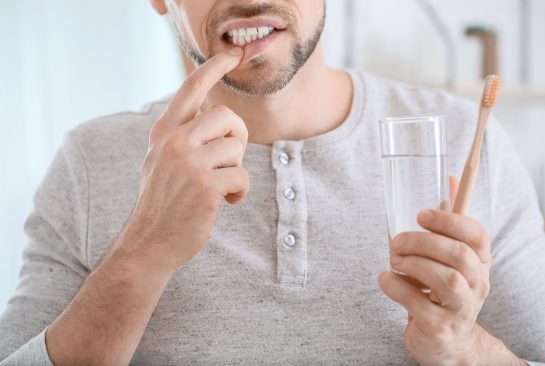- SHOWCASE

Oral Thrush Causes in Adults: Tips for Triggers and Prevention
Oral thrush is a common condition in adults, characterised by white, creamy patches in the mouth caused by an overgrowth of candida fungus. Although often harmless, it can be uncomfortable and may signal underlying health issues. Understanding oral thrush causes in adults can help you manage and prevent it effectively.
How to Identify Oral Thrush
Oral thrush appears as white or yellow patches on the tongue, gums or cheeks. These patches can sometimes cause discomfort, redness, or a cottony feeling in your mouth. In severe cases, swallowing or speaking may become difficult.
Common Causes of Oral Thrush in Adults
- Weakened Immune System
If your immune system is compromised, candida can overgrow, leading to thrush. This is common in individuals with conditions such as HIV, cancer or diabetes. - Antibiotic Use
Antibiotics can disrupt the balance of bacteria in your mouth, reducing beneficial bacteria that normally keep candida in check. Prolonged or frequent antibiotic use increases your risk. - Dry Mouth
Saliva helps wash away bacteria and maintain oral balance. A dry mouth, often caused by medications or dehydration, provides an ideal environment for candida to thrive. - Corticosteroids
Inhalers or oral medications containing corticosteroids, especially when used without proper rinsing, can increase the likelihood of thrush in adults. - Poor Oral Hygiene
Neglecting oral hygiene allows bacteria and fungi to multiply, raising the risk of thrush. - Dentures
Wearing ill-fitting dentures or failing to clean them properly can trap moisture, creating a breeding ground for candida. - Smoking
Smoking weakens your immune defences in the mouth and disrupts the natural balance of microorganisms, making you more prone to oral thrush. - High Blood Sugar Levels
If you have diabetes or poorly controlled blood sugar, higher glucose levels in saliva can feed fungal growth.
Preventing Oral Thrush
If you want to reduce your risk of thrush, consider these preventative steps:
- Maintain Oral Hygiene
Brush your teeth at least twice daily and floss regularly. If you use a corticosteroid inhaler, rinse your mouth thoroughly after each use to remove residue that could encourage fungal growth. - Clean and Care for Dentures
If you wear dentures, remove them overnight and clean them daily. Ensure they fit properly to prevent irritation or moisture build-up that could lead to thrush. - Monitor Antibiotic Use
Only use antibiotics as prescribed, and avoid overusing them. If you need to take antibiotics, consider discussing probiotic supplements with your doctor to restore healthy bacteria. - Stay Hydrated
Drink plenty of water to keep your mouth moist. If you suffer from chronic dry mouth, ask your dentist about artificial saliva products. - Control Blood Sugar Levels
Managing diabetes effectively can help prevent conditions like thrush. Work with your doctor to monitor your blood sugar and make dietary adjustments as needed. - Quit Smoking
Reducing or quitting smoking can strengthen your oral defences and decrease the likelihood of developing oral thrush.
Treating Oral Thrush
If you notice persistent signs of thrush, don’t ignore it. While mild cases may clear on their own, others require medical attention. Treatment options include:
- Antifungal Medications: Your doctor may prescribe antifungal lozenges, rinses, or tablets to eliminate the infection.
- Improved Oral Care: Addressing the triggers, such as poor hygiene or denture care, is crucial for effective treatment.
- Diet Adjustments: Reducing sugary and starchy foods can help limit fungal growth.
When to Seek Medical Advice
If your symptoms persist or worsen, consult a healthcare provider. Thrush can sometimes indicate underlying health concerns that require further evaluation, such as an immune disorder or poorly controlled diabetes.
Remember, good oral habits and overall health are your best defences against thrush.







